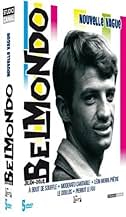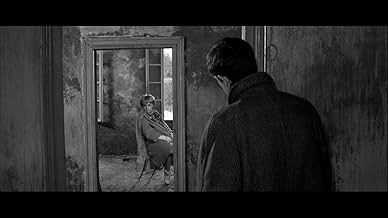Moderato cantabile
- 1960
- 1h 31min
CALIFICACIÓN DE IMDb
6.9/10
1.4 k
TU CALIFICACIÓN
Una mujer adinerada y aburrida es testigo de un crimen pasional y conoce a otro testigo. Le pregunta por la historia de la víctima y se enamora de él.Una mujer adinerada y aburrida es testigo de un crimen pasional y conoce a otro testigo. Le pregunta por la historia de la víctima y se enamora de él.Una mujer adinerada y aburrida es testigo de un crimen pasional y conoce a otro testigo. Le pregunta por la historia de la víctima y se enamora de él.
- Dirección
- Guionistas
- Elenco
- Premios
- 1 premio ganado y 1 nominación en total
Opiniones destacadas
the atmosphere. the Duras mark. the mark of Peter Brooks. and the performances. a Belmondo who conquest a special status, exploring a role who has the force of nuances. Jeanne Moreau - the same and different. the piano's lessons. and the city. a film about solitude in a honest, cruel manner. slices from Madame Bovary. and the search of sense in the presence of the other. the mixture of temptation and fear, expectation and sin, the form of illusion and the brutal end does it a gem. not only for the artistic virtues but for a special manner to use the novel for the portrait of a small world. a film of music as piece from silhouettes, dialogs and fall. a not real comfortable film. but useful.
In a small provincial town that time neglects, two lost souls meander round quite circumspect, an imperceptible entwine, fading in and out of time, both longing for a moment to connect. One is captured in a marriage like a fly, cocooned inside a coffin left to die, the other, isolated, all his options firmly gated, unable to remove the bonds that tie.
Once again, Jeanne Moreau delivers a performance few other actors could have managed, both then and now, more than ably supported by a sullen Jean-Paul Belmondo, they both leave you wishing they were alive in a more modern world, where tradition and fear of the institutions that bind them have all but vanished, and they can be who they want to be. Although without those shackles the connections may well have been quite different.
Once again, Jeanne Moreau delivers a performance few other actors could have managed, both then and now, more than ably supported by a sullen Jean-Paul Belmondo, they both leave you wishing they were alive in a more modern world, where tradition and fear of the institutions that bind them have all but vanished, and they can be who they want to be. Although without those shackles the connections may well have been quite different.
for the Duras's atmosphere. for the lead actors. for the story, landscapes, dialogs, the piano lesson or for its end. for the illustration of a state of soul as result of a mixture of sin, fear, high expectations and fall. a film about a woman and a man. all in simple manner presented. a town. and few meetings. and level of dark revelation. a film of silhouettes and silence. and it is enough for discover an universe who could be part from yourself. a film about choices. and about a strange form of music. Jeanne Moreau is not a surprise. Belmondo is the perfect choice despite the expectations about other actor if you read the novel. the result - not comfortable but good occasion for reflection. about love. and about versions of Madame Bovary.
This has to be one of the dullest films of the early Sixties. Remember that Godard, Malle, Truffaut and company had been challenging the traditions of story telling; the world seemed young again, and full of possibilities. Moderato cantabile has nothing of this spirit. It might have been made by an old-guard director like Clément or Delannoy (if they had decided to take a chance on a Duras script).
There isn't much energy or interest in this story: what happens in the first ten minutes is endlessly rehashed throughout the remainder. Belmondo is ill at ease here, or at least seems that way to me--there is no chance for any extroversion, exuberance or even anger from the character. Jeanne Moreau is used decoratively (Brook must have seen what Resnais was able to do with Delphine Seyrig in Last Year In Marienbad) and always looks elegant, if never really desperate or anguished. You know something's wrong when the piano teacher provides much of the dramatic interest: she's bullying the child into giving her a Diabelli sonata "moderately, with a singing feeling".
Note: I have just remembered that Clément did do a Duras script (Barrage contre le Pacifique) in 1958.
There isn't much energy or interest in this story: what happens in the first ten minutes is endlessly rehashed throughout the remainder. Belmondo is ill at ease here, or at least seems that way to me--there is no chance for any extroversion, exuberance or even anger from the character. Jeanne Moreau is used decoratively (Brook must have seen what Resnais was able to do with Delphine Seyrig in Last Year In Marienbad) and always looks elegant, if never really desperate or anguished. You know something's wrong when the piano teacher provides much of the dramatic interest: she's bullying the child into giving her a Diabelli sonata "moderately, with a singing feeling".
Note: I have just remembered that Clément did do a Duras script (Barrage contre le Pacifique) in 1958.
"Moderato Cantibile" was only the second film by the great British director Peter Brook and it proved, like Welles before him, that he was equally adept in either medium. It was made in France in 1960 and has now largely been forgotten, though at the time the magazine Films and Filming selected it as the best film of the year from any source and it's a masterpiece. It's also one of the most beautiful black and white films to be made in the Cinemascope format. (Armand Thirard was the DOP).
It's about a respectable,if unhappily married, woman in a grim little coastal town in France who drifts into an affair of sorts with a man from farther down the social ladder. They are played, magnificently, by Jeanne Moreau and Jean-Paul Belmondo. The oblique, brilliant screenplay is by Marguerite Duras and Gerard Jarlot from a novel by Duras and anyone remotely interested in cinema as an art-form should seek it out.
It's about a respectable,if unhappily married, woman in a grim little coastal town in France who drifts into an affair of sorts with a man from farther down the social ladder. They are played, magnificently, by Jeanne Moreau and Jean-Paul Belmondo. The oblique, brilliant screenplay is by Marguerite Duras and Gerard Jarlot from a novel by Duras and anyone remotely interested in cinema as an art-form should seek it out.
¿Sabías que…?
- TriviaAccording to biographer Olivier Todd, Peter Brook offered writer Albert Camus an acting job in Moderato cantabile. Camus died in a car accident before he could take it.
- ErroresIn original release copies the title card read "Moderato contabile", but they were not retired from circulation.
- Citas
Anne Desbarèdes: Try to remember: Moderato means gently - it's nearly the same - and Cantabile means melodiously. It's easy.
- ConexionesFeatured in Jeanne M. - Côté cour, côté coeur (2008)
Selecciones populares
Inicia sesión para calificar y agrega a la lista de videos para obtener recomendaciones personalizadas
- How long is Seven Days... Seven Nights?Con tecnología de Alexa
Detalles
- Tiempo de ejecución1 hora 31 minutos
- Color
- Relación de aspecto
- 2.35 : 1
Contribuir a esta página
Sugiere una edición o agrega el contenido que falta

Principales brechas de datos
By what name was Moderato cantabile (1960) officially released in India in English?
Responda



















